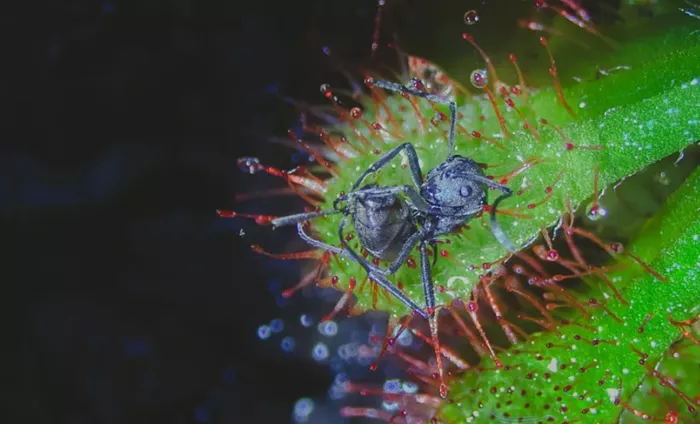Insects face numerous threats from carnivorous plants, and a newly identified danger is an acid-loving fungus.
Sundew plants feature tentacle-like leaves that ensnare flies and other insects with a sticky substance called mucilage. As trapped insects suffocate or tire out, the plant secretes enzymes that break down their bodies, allowing the leaves to absorb nutrients.
Recent research published in Nature Microbiology reveals that the fungus Acrodontium crateriforme plays a crucial role in this digestive process. This fungus not only produces additional enzymes but also lowers the acidity of the leaf environment, enhancing the effectiveness of both plant and fungal enzymes in the mucilage.
“Ultimately, this creates a synergistic effect,” says Isheng Jason Tsai, an evolutionary biologist at Academia Sinica in Taipei, Taiwan. The faster breakdown of prey results in more nutrients for the plant.
Previous studies have suggested that bacteria in the mucilage of other carnivorous plants, like pitcher plants, may assist in digestion. Tsai notes that confirming the role of a specific microbe alters our understanding of plant carnivory and opens doors to exploring other carnivorous plants and their microbial partners.
Tsai and his team studied microbes on spoon-leaved sundews (Drosera spatulata), found in temperate and tropical areas, including Taiwan. They discovered a wide variety of bacteria and fungi, with A. crateriforme being the most prevalent, making up about 40% of the genetic material in the leaf mucilage.
To test the fungus’s effect, the researchers added powdered ants to the plants. They found that A. crateriforme reduced digestion time by about 20%. Plants without microbes took an average of 92 hours to digest the powder, while those with the fungus digested it in 73 hours.
Additionally, the fungus is present on other Drosera species in the UK, as well as D. rotundifolia and purple pitcher plants (Sarracenia purpurea) in the US. The presence of A. crateriforme across three continents indicates a long-standing relationship with sundew plants. This suggests that the partnership may be a widespread evolutionary strategy in carnivorous plants, benefiting both the plants and their insect prey.
Related topics:
- The Mysterious Plant That Turned Ancient Israel into a Perfume Leader
- Jackson’s Greenhouse Recommends Plant Protection as Fall Arrives
- Overnight Frost and Freeze Risk: What to Do with Your Outdoor Plants


